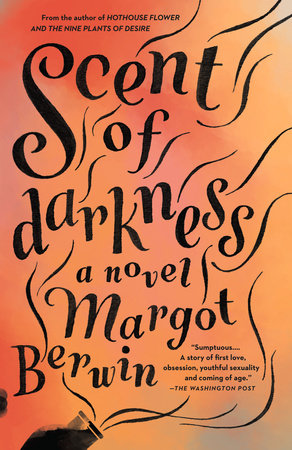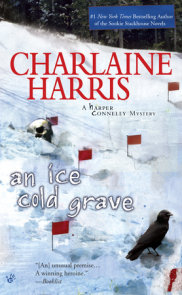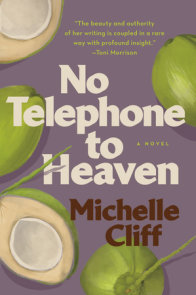READERS GUIDE
The questions for discussion contained in this guide are designed to enhance your reading group’s discussion of Scent of Darkness. This hotly anticipated second novel from Margot Berwin is a magical, seductive story about the power of scent and about what happens when a magical perfume renders a young woman irresistible.Introduction
Evangeline grows up understanding the extraordinary effects of fragrance. Her grandmother Louise is a gifted aromata, a master of scentmaking and perfume. When Eva was a girl, Louise carefully explained that a drop of lavender in the wash would make her dream of the man she would marry; eucalyptus would make her taller; amandine, fatter; and jasmine, Louise promised, would wrap her life in a mystery. When Eva is eighteen, Louise leaves her the ultimate gift—a scent created just for her. The small perfume vial is accompanied by a note in Louise’s slanted script: “Do not remove the stopper, Evangeline, unless you want everything in your life to change.” (p. 42)From the moment Eva places a drop—the essence of fire and jasmine, leather and rose (p. 52)—on her neck, men dance closer to her, women bury their noses deep into her hair, even the cats outside her bedroom cry to be near her. After a lifetime spent blending into the background, Eva is suddenly the object of intense desire from everyone around her. Strangers follow her down the street; a young boy appears at her door asking for a favor; and two men, one kind and good, the other dark and seductive, fall deeply, madly in love with her. As her greatest gift becomes an unbearable curse, Eva must uncover the secret of her scent and the message her grandmother, the woman who loved her most, wanted to tell her.
Questions and Topics for Discussion
1. Is Gabriel’s love for Eva more or less powerful because it is based on the magic of the perfume? Is his love “real”?
2. Describe Evangeline’s relationship with her mother, Loretta. How does this shape Eva? How does it compare to Eva’s relationship with Louise? Does one relationship affect the other?
3. Stone Crow is home to Evangeline—the smells, the texture of the stone, the coolness of the air, and the memories of Louise. Is there a place that is like Stone Crow to you? What is it that makes it so special?
4. The author continues to engage all the reader’s senses in her descriptions of New Orleans—the heat, the sounds, the architecture. How are the differences in Eva’s new environment reflected in the story?
5. Madame Susteen tells Eva: “I smelled you the second your foot touched down in New Orleans. I know what’s in your grandmother’s perfume. But if I tell you, you’ll never understand for yourself the message she’s trying to send. Find out what’s in that scent. It’s the key to changing the terrible, terrible nature of your cards.” (p. 87) What was Louise’s message? What was the key to the perfume?
6. One of Evangeline’s tarot cards is the upside-down Magician. To whom does this refer in the book?
7. How does Levon fit into the story? What function does his character serve?
8. Michael is a painter. Does Eva’s perfume change the way in which Michael paints, or only his belief in it?
9. The author engages each of the senses when describing Eva’s painting sessions with Michael—the feel of the bench she lies on, the stifling heat of midday, the mermaids painted all around, the sound of the dripping fountain, the headiness of the wine, and of course, the scent of paint and the scent of the perfume. What effect does the sheer sensuousness of the situation have on Eva? What about Michael?
10. Although Michael never appears to be an innocent character, he becomes much darker as the story goes on. Do his actions become more malevolent because of Eva’s scent, or do you think Michael’s true nature becomes exposed to the reader?
11. Does Michael love Eva? Are his feelings toward her different from Gabriel’s?
12. Does Eva love Michael? How are her feelings different from those she has toward Gabriel?
13. What is the difference between love and desire?
14. At the gallery opening, Gabriel says to Evangeline: “Do you think this is what Louise had in mind? Do you think she made this incredible scent for Michael Bon Chance? Is that what you think?” (p. 163) Eva replies that she doesn’t know. What do you, as the reader, think?
15. Would Eva and Gabriel have fallen in love without the perfume? Did the interference of Michael help or hinder the true nature of their feelings?
16. Was Louise a magician?
17. Does Evangeline deserve to be with Gabriel? Does he deserve her? Can/should love be earned?
18. Do you have a favorite scent? What is it and why?
19. Is there a scent that conjures a specific memory or vivid feeling for you? What about a specific person?
20. If you could become irresistible to many people, would you? Why or why not?
21. Do you believe in love at first sight? What about first smell? Or touch?
22. What is the most important sense to you? Why?
23. As people change, so do their senses. Eyesight dims, hearing weakens, even memory falters. How do you think love changes? Does it gain/lose power or change into something else entirely?






















